Unit 6 Outdoor fun Grammar课件 (牛津译林版七年级下册)
文档属性
| 名称 | Unit 6 Outdoor fun Grammar课件 (牛津译林版七年级下册) | 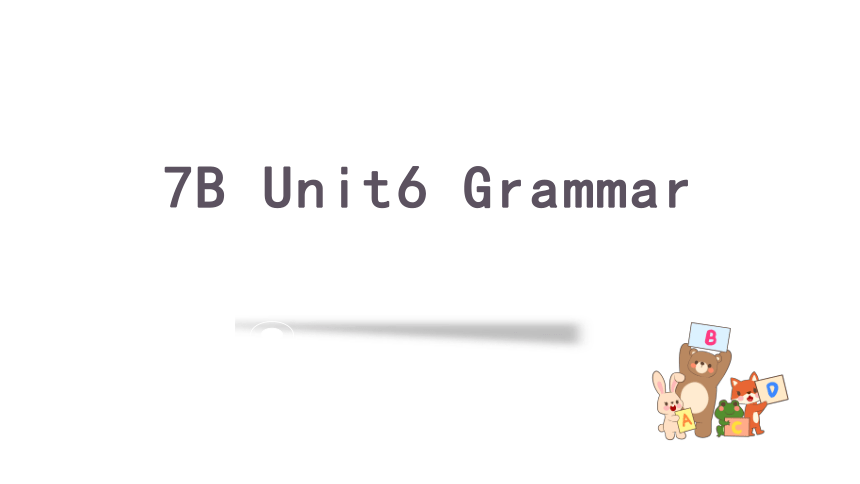 | |
| 格式 | pptx | ||
| 文件大小 | 8.5MB | ||
| 资源类型 | 试卷 | ||
| 版本资源 | 牛津译林版 | ||
| 科目 | 英语 | ||
| 更新时间 | 2024-03-11 18:29:49 | ||
图片预览

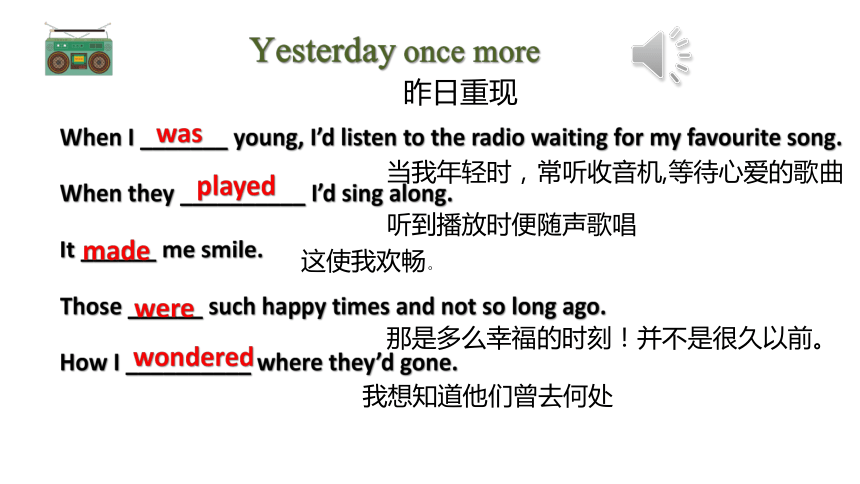
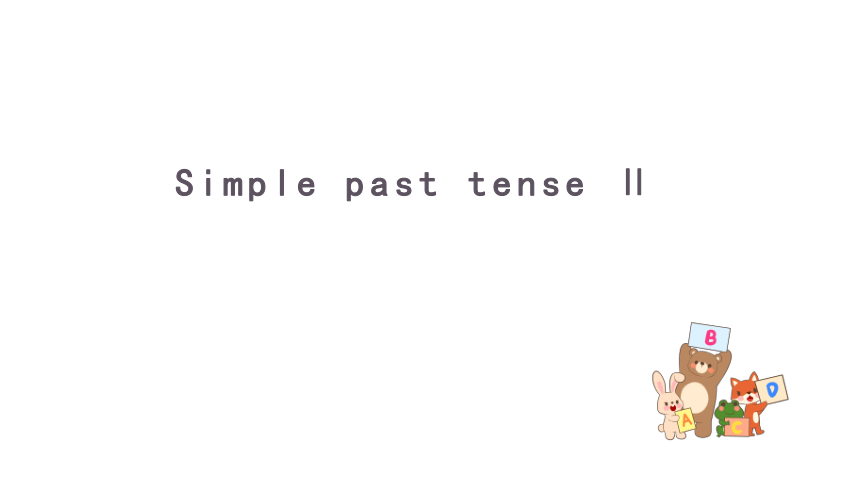
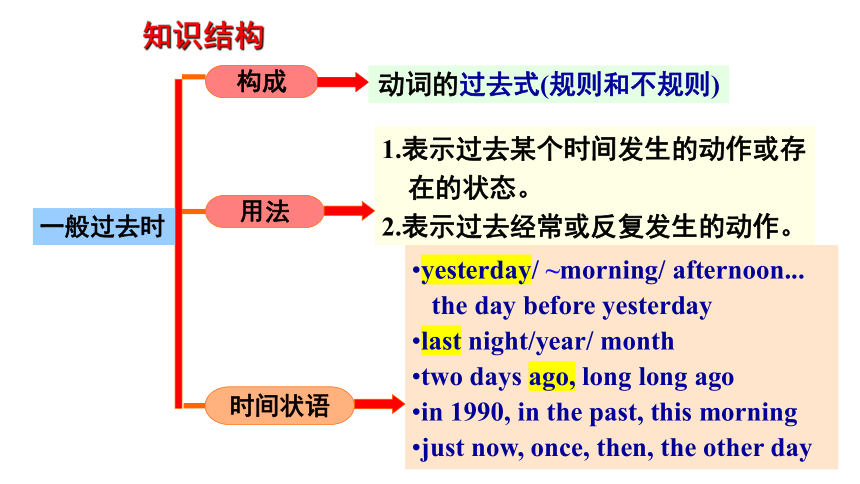
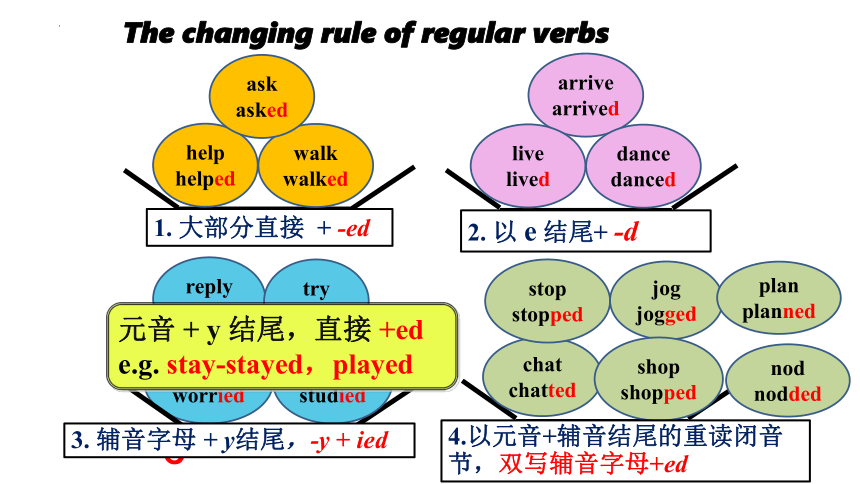


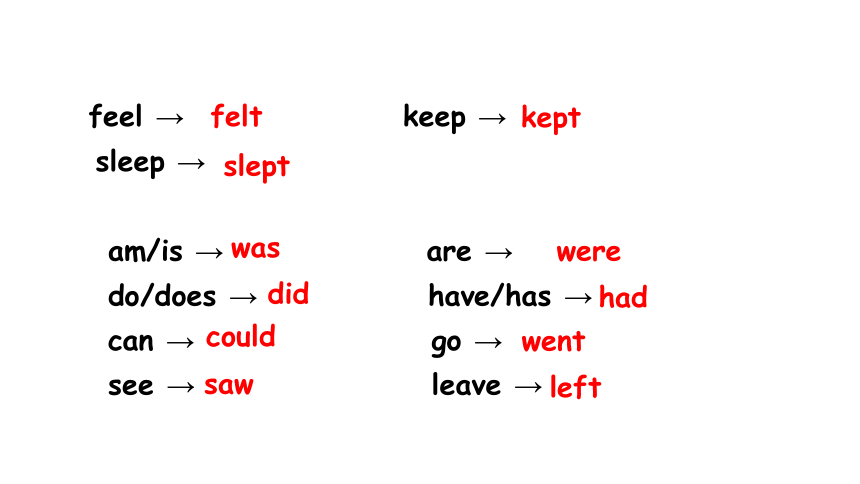
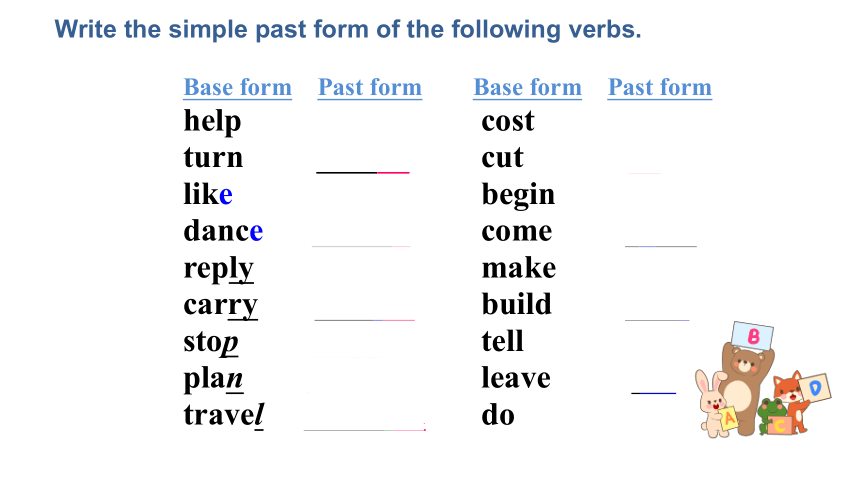
文档简介
(共28张PPT)
7B Unit6 Grammar
When I _______ young, I’d listen to the radio waiting for my favourite song.
When they __________ I’d sing along.
It ______ me smile.
Those ______ such happy times and not so long ago.
How I __________ where they’d gone.
was
played
made
were
wondered
Yesterday once more
昨日重现
当我年轻时,常听收音机,等待心爱的歌曲
听到播放时便随声歌唱
这使我欢畅。
那是多么幸福的时刻!并不是很久以前。
我想知道他们曾去何处
Grammar
Simple past tense Ⅱ
构成
用法
时间状语
动词的过去式(规则和不规则)
1.表示过去某个时间发生的动作或存
在的状态。
2.表示过去经常或反复发生的动作。
yesterday/ ~morning/ afternoon...
the day before yesterday
last night/year/ month
two days ago, long long ago
in 1990, in the past, this morning
just now, once, then, the other day
知识结构
一般过去时
A
B
C
D
help
helped
walk
walked
ask
asked
arrive
arrived
reply
replied
study
studied
worry
worried
chat
chatted
live
lived
dance
danced
stop
stopped
jog
jogged
try
tried
shop
shopped
1. 大部分直接 + -ed
2. 以 e 结尾+ -d
3. 辅音字母 + y结尾,-y + ied
4.以元音+辅音结尾的重读闭音节,双写辅音字母+ed
元音 + y 结尾,直接 +ed
e.g. stay-stayed,played
The changing rule of regular verbs
plan
planned
nod
nodded
cut/put → let →
cost → read →
begin → drink →
give → sing →
swim → sit →
come → run →
cut/ put
let
cost
read
began
drank
gave
sang
sat
swam
came
ran
/red/
Simple past tense of verbs(irregular)
draw → fall →
grow → know →
wake → forget →
get → ride →
drive → write →
drew
fell
grew
knew
woke
forgot
got
rode
drove
wrote
feel → keep →
sleep →
am/is → are →
do/does → have/has →
can → go →
see → leave →
felt
kept
slept
was
were
did
had
went
saw
left
could
Base form Past form
help helped turn turned like liked
dance danced
reply replied
carry carried
stop stopped
plan planned
travel travelled
Base form Past form
cost cost
cut cut
begin began
come came
make made
build built
tell told
leave left
do did
Write the simple past form of the following verbs.
1. We ________ (go) to the cinema last night.
2. Jim _______ (do) a lot of things yesterday.
3. Her mother ________ (clean) the room yesterday.
4. John ______ (be) in Beijing last summer.
5. The boy ________ (chat) with his classmates just now.
6. Miss Li ________ (buy) a kilo of meat yesterday.
7. He usually goes to work on foot, but he ______ (take) the bus
this morning.
Fill in the blanks.
went
did
cleaned
was
chatted
bought
took
Outdoor Fun
May 1st
Dear Diary,
I like being outside, so I went to the countryside(乡下) with my parents on May Day morning. It was sunny. We rode a bike there.
The streets weren’t busy. The flowers were so pretty that I took lots of photos. I didn’t pick any flowers, because it was not good to do that. Then we climbed a mountain. There weren’t other people. It was amazing! We also had a picnic on the mountain top. After lunch I picked many strawberries. All of them were big and sweet.
In the afternoon I went fishing with my father. The river was very clean, but I didn’t go swimming because it wasn’t so hot. At first, we didn’t see many fish, but at last we caught a big one.
In the evening we didn’t cook that fish. We ate nice local food in a famous restaurant.
It was a wonderful trip!
Weather
Environment 环境
Feeling
Weather:
Environment:
(环境)
Feelings:
It was sunny.
The flowers were so pretty.
The streets weren’t busy.
It wasn’t so hot.
was—wasn’t
were—weren’t
The river was very clean.
It was a wonderful trip!
It was amazing!
There weren’t other people.
Positive sentence(肯定句):
_____________ was+其他.
_____________ were+其他.
Negative sentence(否定句):
_____________ wasn’t+其他.
_____________ weren’t+其他.
I/He/She/It
You/We/They
You/We/They
I/He/She/It
was—wasn’t
were—weren’t
一般过去时句式:be 动词
Practise
Mary (be) at home yesterday.
She (be not) at school.
2. The boy (be) in the library now.
But he (be) in the classroom just now, because he had an Chinese lesson.
3. We (be not) in Beijing last week.
We (be) at home.
4. Kitty and I (be not) happy because of the bad weather this morning.
was
wasn’t
is
was
weren’t
were
weren’t
May 1st
Dear Diary,
I like being outside, so I went to the countryside(乡下) with my parents on May Day morning. It was sunny. We rode a bike there.
The streets in the town weren’t busy. The flowers were so pretty that I took lots of photos. I didn’t pick any flowers, because it was not good to do that. Then we climbed a mountain. There weren’t other people. It was amazing! We also had a picnic on the mountain top. After lunch I picked many strawberries. All of them were big and sweet.
In the afternoon I went fishing with my father. The river was very clean, but I didn’t go swimming because it wasn’t so hot. At first, we didn’t see many fish, but at last we caught a big one.
In the evening we didn’t cook that fish. We ate nice local food in a famous restaurant.
It was a wonderful trip!
What did Tom and his family do in the town
What didn’t Tom and his family do in the town
I took lots of photos.
I picked many strawberries.
I went fishing with my father.
We ate nice local food in a restaurant.
At last we caught a big one .
I didn’t pick any flowers.
I didn’t go swimming.
We didn’t eat that fish.
At first,we didn’t see many fish .
What did Tom and his family do in the town
We climbed a mountain.
What didn’t Tom and his family do in the town
don’t/ doesn’t
-----didn’t
did--didn't
We also had a picnic on the mountain top.
一般过去时句式:行为动词
Positive sentence(肯定句):
I/You
We/They+
He/She/It
the simple past form of the verb ‘to do’(行为动词一般过去式)
Negative sentence(否定句):
I/You
We/They+ didn't
He/She/It
the basic form of the verb ‘to do’
( 行为动词原形))
We rode a bike there.
Practice
We always (go) to Shanghai when I was a child.
2. They (not go) to school last Wednesday, because they (have) a match.
3. Mike (drive) to Nanjing three days ago, he __________ (not, take) a train here.
4. She often (leave) the office early after work, but she (not come) back till 11p.m. yesterday.
went
didn’t go
drove
didn’t take
leaves
didn’t come
had
Was it a wonderful trip
Yes, it was.
Was it rainy
No, it wasn’t.
Did they have a picnic
Yes, they did.
Did they pick any flowers
No, they didn’t.
More Questions
Was+_______________+ happy
Were+_________________+happy
I/he/she/it
you/we/they
the simple past tense of the verb ‘to do’
Did+ have a good time
the simple past tense of the verb ‘to be’
the basic form of the verb ‘to do’
(行为动词原形)
General question(一般疑问句)
I/You
We/They+
He/She/It
Practise
The girl was at home last night. (改成一般疑问句,并作肯定回答)
2. They played football on the playground ten
minutes ago. (改成一般疑问句,并作否定回答)
Was the girl at home last night
Yes, she was.
Did they play football on the playground ten minutes ago
No, they didn’t.
Yesterday was Sunday. I _________ the park and
_________ a good time. Simon did not _________
football. He _________ playing volleyball with his
friend. Kitty likes shopping. She _________ some
shopping with her mum yesterday afternoon.
Daniel did not _________ out yesterday. He
_________ at home and _________ some books.
Weekend activities
do go have play practice read stay visit
visited
had
play
practised
did
go
stayed
read
Sandy: (1)______ you and your family ______ (go) camping last
week
Simon: No, we (2)______ . We (3)______ (go) camping last month.
Sandy: (4)______ (be) it interesting
Simon: Yes, it (5)______ .
Sandy: What (6)______ you ______ (do) there
Simon: We (7)______ (put) up our tent near a lake. My cousin
Annie and I (8)______ (be) very happy. We also (9) ______
(row) a boat on the lake.
Sandy: (10) ______ you______ (stay) outside all night
Simon: Yes, we (11) ______ . The camping trip (12) ______ (be)
really wonderful.
Did
go
didn’t
went
Was
was
did
do
put
were
rowed
Did
stay
did
was
Sandy is asking Simon about his camping trip with his family. Complete the conversation.
1. We put up our tent near a lake.
put up 此处意为“搭,竖起”。
put up还可意为“挂起;张贴;举起;抬起”。
与 put 相关的短语:
put on穿上 put off推迟 put away收拾 put out扑灭
put down放下 put...in order把...整理得井井有条 put back 放回
Language points
2. He practised playing volleyball with his friend.
practise 动词,+sth / practise doing sth. 意为“练习做某事”。
practise spoken English
practice既可用作动词也可用作名词
Practice makes perfect. 孰能生巧。
Language points
Language points
3. Did you stay outside all night?
all night 意为“通宵,整夜”。注意 night 之前没有定冠词。
拓展:all day and all night 表示“整日整夜”。
Exercise
1. -Sorry, but your address again, please. I ___ catch it.
-It‘s 28 Zhongshan Road.
A. didn't B. don't C. won't D. wouldn’t
2. -Did you wait for your father very long
-Yes, I ____ to bed until two in the morning.
A. did go B. didn't go C. had gone D. went
3. -Excuse me. Look at the sign: NO SMOKING!
-Sorry, I ___ it.
A. don't see B. didn't see C. haven't seen D. won't see
A
B
B
1.They had a good time in the park last weekend.(改成否定句)
They ________________ a good time in the park last weekend.
2.They were on the playground just now. (改成一般疑问句)
____________ on the playground just now
3.We met at the school gate yesterday.(改成否定句)
__________________________________yesterday.
didn’t have
Were they
We didn’t meet at the school gate
7B Unit6 Grammar
When I _______ young, I’d listen to the radio waiting for my favourite song.
When they __________ I’d sing along.
It ______ me smile.
Those ______ such happy times and not so long ago.
How I __________ where they’d gone.
was
played
made
were
wondered
Yesterday once more
昨日重现
当我年轻时,常听收音机,等待心爱的歌曲
听到播放时便随声歌唱
这使我欢畅。
那是多么幸福的时刻!并不是很久以前。
我想知道他们曾去何处
Grammar
Simple past tense Ⅱ
构成
用法
时间状语
动词的过去式(规则和不规则)
1.表示过去某个时间发生的动作或存
在的状态。
2.表示过去经常或反复发生的动作。
yesterday/ ~morning/ afternoon...
the day before yesterday
last night/year/ month
two days ago, long long ago
in 1990, in the past, this morning
just now, once, then, the other day
知识结构
一般过去时
A
B
C
D
help
helped
walk
walked
ask
asked
arrive
arrived
reply
replied
study
studied
worry
worried
chat
chatted
live
lived
dance
danced
stop
stopped
jog
jogged
try
tried
shop
shopped
1. 大部分直接 + -ed
2. 以 e 结尾+ -d
3. 辅音字母 + y结尾,-y + ied
4.以元音+辅音结尾的重读闭音节,双写辅音字母+ed
元音 + y 结尾,直接 +ed
e.g. stay-stayed,played
The changing rule of regular verbs
plan
planned
nod
nodded
cut/put → let →
cost → read →
begin → drink →
give → sing →
swim → sit →
come → run →
cut/ put
let
cost
read
began
drank
gave
sang
sat
swam
came
ran
/red/
Simple past tense of verbs(irregular)
draw → fall →
grow → know →
wake → forget →
get → ride →
drive → write →
drew
fell
grew
knew
woke
forgot
got
rode
drove
wrote
feel → keep →
sleep →
am/is → are →
do/does → have/has →
can → go →
see → leave →
felt
kept
slept
was
were
did
had
went
saw
left
could
Base form Past form
help helped turn turned like liked
dance danced
reply replied
carry carried
stop stopped
plan planned
travel travelled
Base form Past form
cost cost
cut cut
begin began
come came
make made
build built
tell told
leave left
do did
Write the simple past form of the following verbs.
1. We ________ (go) to the cinema last night.
2. Jim _______ (do) a lot of things yesterday.
3. Her mother ________ (clean) the room yesterday.
4. John ______ (be) in Beijing last summer.
5. The boy ________ (chat) with his classmates just now.
6. Miss Li ________ (buy) a kilo of meat yesterday.
7. He usually goes to work on foot, but he ______ (take) the bus
this morning.
Fill in the blanks.
went
did
cleaned
was
chatted
bought
took
Outdoor Fun
May 1st
Dear Diary,
I like being outside, so I went to the countryside(乡下) with my parents on May Day morning. It was sunny. We rode a bike there.
The streets weren’t busy. The flowers were so pretty that I took lots of photos. I didn’t pick any flowers, because it was not good to do that. Then we climbed a mountain. There weren’t other people. It was amazing! We also had a picnic on the mountain top. After lunch I picked many strawberries. All of them were big and sweet.
In the afternoon I went fishing with my father. The river was very clean, but I didn’t go swimming because it wasn’t so hot. At first, we didn’t see many fish, but at last we caught a big one.
In the evening we didn’t cook that fish. We ate nice local food in a famous restaurant.
It was a wonderful trip!
Weather
Environment 环境
Feeling
Weather:
Environment:
(环境)
Feelings:
It was sunny.
The flowers were so pretty.
The streets weren’t busy.
It wasn’t so hot.
was—wasn’t
were—weren’t
The river was very clean.
It was a wonderful trip!
It was amazing!
There weren’t other people.
Positive sentence(肯定句):
_____________ was+其他.
_____________ were+其他.
Negative sentence(否定句):
_____________ wasn’t+其他.
_____________ weren’t+其他.
I/He/She/It
You/We/They
You/We/They
I/He/She/It
was—wasn’t
were—weren’t
一般过去时句式:be 动词
Practise
Mary (be) at home yesterday.
She (be not) at school.
2. The boy (be) in the library now.
But he (be) in the classroom just now, because he had an Chinese lesson.
3. We (be not) in Beijing last week.
We (be) at home.
4. Kitty and I (be not) happy because of the bad weather this morning.
was
wasn’t
is
was
weren’t
were
weren’t
May 1st
Dear Diary,
I like being outside, so I went to the countryside(乡下) with my parents on May Day morning. It was sunny. We rode a bike there.
The streets in the town weren’t busy. The flowers were so pretty that I took lots of photos. I didn’t pick any flowers, because it was not good to do that. Then we climbed a mountain. There weren’t other people. It was amazing! We also had a picnic on the mountain top. After lunch I picked many strawberries. All of them were big and sweet.
In the afternoon I went fishing with my father. The river was very clean, but I didn’t go swimming because it wasn’t so hot. At first, we didn’t see many fish, but at last we caught a big one.
In the evening we didn’t cook that fish. We ate nice local food in a famous restaurant.
It was a wonderful trip!
What did Tom and his family do in the town
What didn’t Tom and his family do in the town
I took lots of photos.
I picked many strawberries.
I went fishing with my father.
We ate nice local food in a restaurant.
At last we caught a big one .
I didn’t pick any flowers.
I didn’t go swimming.
We didn’t eat that fish.
At first,we didn’t see many fish .
What did Tom and his family do in the town
We climbed a mountain.
What didn’t Tom and his family do in the town
don’t/ doesn’t
-----didn’t
did--didn't
We also had a picnic on the mountain top.
一般过去时句式:行为动词
Positive sentence(肯定句):
I/You
We/They+
He/She/It
the simple past form of the verb ‘to do’(行为动词一般过去式)
Negative sentence(否定句):
I/You
We/They+ didn't
He/She/It
the basic form of the verb ‘to do’
( 行为动词原形))
We rode a bike there.
Practice
We always (go) to Shanghai when I was a child.
2. They (not go) to school last Wednesday, because they (have) a match.
3. Mike (drive) to Nanjing three days ago, he __________ (not, take) a train here.
4. She often (leave) the office early after work, but she (not come) back till 11p.m. yesterday.
went
didn’t go
drove
didn’t take
leaves
didn’t come
had
Was it a wonderful trip
Yes, it was.
Was it rainy
No, it wasn’t.
Did they have a picnic
Yes, they did.
Did they pick any flowers
No, they didn’t.
More Questions
Was+_______________+ happy
Were+_________________+happy
I/he/she/it
you/we/they
the simple past tense of the verb ‘to do’
Did+ have a good time
the simple past tense of the verb ‘to be’
the basic form of the verb ‘to do’
(行为动词原形)
General question(一般疑问句)
I/You
We/They+
He/She/It
Practise
The girl was at home last night. (改成一般疑问句,并作肯定回答)
2. They played football on the playground ten
minutes ago. (改成一般疑问句,并作否定回答)
Was the girl at home last night
Yes, she was.
Did they play football on the playground ten minutes ago
No, they didn’t.
Yesterday was Sunday. I _________ the park and
_________ a good time. Simon did not _________
football. He _________ playing volleyball with his
friend. Kitty likes shopping. She _________ some
shopping with her mum yesterday afternoon.
Daniel did not _________ out yesterday. He
_________ at home and _________ some books.
Weekend activities
do go have play practice read stay visit
visited
had
play
practised
did
go
stayed
read
Sandy: (1)______ you and your family ______ (go) camping last
week
Simon: No, we (2)______ . We (3)______ (go) camping last month.
Sandy: (4)______ (be) it interesting
Simon: Yes, it (5)______ .
Sandy: What (6)______ you ______ (do) there
Simon: We (7)______ (put) up our tent near a lake. My cousin
Annie and I (8)______ (be) very happy. We also (9) ______
(row) a boat on the lake.
Sandy: (10) ______ you______ (stay) outside all night
Simon: Yes, we (11) ______ . The camping trip (12) ______ (be)
really wonderful.
Did
go
didn’t
went
Was
was
did
do
put
were
rowed
Did
stay
did
was
Sandy is asking Simon about his camping trip with his family. Complete the conversation.
1. We put up our tent near a lake.
put up 此处意为“搭,竖起”。
put up还可意为“挂起;张贴;举起;抬起”。
与 put 相关的短语:
put on穿上 put off推迟 put away收拾 put out扑灭
put down放下 put...in order把...整理得井井有条 put back 放回
Language points
2. He practised playing volleyball with his friend.
practise 动词,+sth / practise doing sth. 意为“练习做某事”。
practise spoken English
practice既可用作动词也可用作名词
Practice makes perfect. 孰能生巧。
Language points
Language points
3. Did you stay outside all night?
all night 意为“通宵,整夜”。注意 night 之前没有定冠词。
拓展:all day and all night 表示“整日整夜”。
Exercise
1. -Sorry, but your address again, please. I ___ catch it.
-It‘s 28 Zhongshan Road.
A. didn't B. don't C. won't D. wouldn’t
2. -Did you wait for your father very long
-Yes, I ____ to bed until two in the morning.
A. did go B. didn't go C. had gone D. went
3. -Excuse me. Look at the sign: NO SMOKING!
-Sorry, I ___ it.
A. don't see B. didn't see C. haven't seen D. won't see
A
B
B
1.They had a good time in the park last weekend.(改成否定句)
They ________________ a good time in the park last weekend.
2.They were on the playground just now. (改成一般疑问句)
____________ on the playground just now
3.We met at the school gate yesterday.(改成否定句)
__________________________________yesterday.
didn’t have
Were they
We didn’t meet at the school gate
